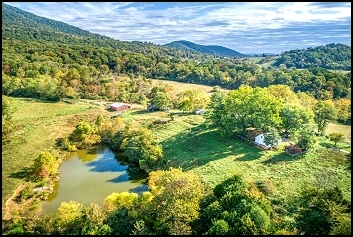Various agencies and organizations across the state of Virginia can hold “open space” or conservation easements on managed lands, forests, and waters. Among those agencies are The Virginia Department of Forestry, The Virginia Outdoors Foundation, the Central Virginia Land Conservancy, and The Thomas Jefferson Soil and Water Conservation District (TJSWCD). Each of those entities serves specific areas of Virginia, depending upon the location and type of property.
A conservation easement is an agreement between a landowner and a private land trust or a governmental conservation agency that limits future development on a property. In doing so, an easement protects the land you love for the benefit of current and future generations.
The purpose of a conservation easement is to protect a property’s particular conservation values, whether that be its farm, forest, water, scenic or cultural attributes. Conservation easements offer flexibility and each one is unique; the terms of an easement and the protections placed on the property are negotiated between the landowner and the conservation organization.
Typically, those terms:
Limit the amount of subdivision and development allowed on the property;
Protect important natural resources, including streams, productive agricultural soils, forests and natural habitat areas;
Limit dumping, mining, grading, blasting on the property;
Allow continuation of productive rural uses, such as agriculture, forestry, hunting, and fishing;
The restrictions in the easement run with the land and apply to all future landowners. The landowner who donates the easement continues to own, use and control the land subject to the terms of the easement. The landowner still decides who has access to the property and for what purpose, just as before. The conservation organization is responsible for enforcing the terms of the conservation easement.
***************
Information below is provided by the Thomas Jefferson Soil and Water Conservation District is a great source of basic guidelines for Virginia farms of all types. One function performed by TJSWCD involves donated easements of rural land for conservation purposes. When a landowner donates an easement, the easement ensures that your wishes for the land will be honored forever, with you deciding the terms and conditions of your permanent easement. So, an easement held by the TJSWCD guarantees that the beauty and natural resources you enjoy on your land will be there for future generations. Easements also protect water resources and may provide state and/or federal tax benefits for the property owner.
 Why donate an easement to the TJSWCD?
Why donate an easement to the TJSWCD?
The Thomas Jefferson Soil and Water Conservation District (TJSWCD) has worked with landowners to protect natural resources for almost 80 years. The TJSWCD Easement Program is unique in that it focuses on preserving small properties (or portions of properties) associated with the protection of water resources. The easement program is open to accepting qualifying land parcels from any landowner in the TJSWCD’s area of program responsibility.
The TJSWCD has the legal authority to hold open space easements under the Virginia Open-Space Land Act §10.1-1700. An open-space easement means a nonpossessory interest of a public body in real property…the purposes of which include retaining or protecting natural or open-space values of real property, assuring its availability for agricultural, forestal, recreational, or open-space use, protecting natural resources, maintaining or enhancing air or water quality, or preserving the historical, architectural or archaeological aspects of real property.
The Program is administered through the Thomas Jefferson Water Resources Protection Foundation (TJWRPF). While the TJWRPF provides administrative functions for the Easement Program, the TJSWCD remains the holder of all easements, decides what easements to accept (upon recommendations from the Foundation), and is responsible for legal enforcement of the easements’ provisions.
The TJSWCD requests a Stewardship Fee for all easements they accept to support the District’s ability to ensure all easements are maintained as the donors intended.
What types of easements does the TJSWCD accept?
Regulatory-Based Easements fulfill federal, state or local requirements intended to protect water quality following development of land. The developer or owner offers to permanently protect open space in lieu of more expensive Best Management Practices and pays the full custodial fees associated with these easements.
Stewardship Easements are open space easements offered voluntarily by the landowner to the District in perpetuity. Landowners are requested to pay a stewardship fee to cover the District’s costs of ensuring the property owners’ long-term wishes for the property’s protection are followed.
StreamKeeper Properties have not yet had a deed of easement filed because funds are not available to pay for the expenses involved. Owners have willingly drafted easement language and enrolled their properties into the StreamKeeper program because they want to see the land protected. The owner can apply for an open space easement, if and when funding becomes available to cover the custodial fee.
Proffers are often offered by developers to mitigate impacts from a development. These may include offers of funding for new roads that are needed to handle increased traffic or funding for schools to provide for increases in school-age populations. The Foundation will accept proffers from developers who wish to mitigate water resource impacts caused by their developments. The proffer may be in the form of an easement to permanently protect other water resources on-site, or may be in the form of funding to provide permanent protection of other properties. (All proffers must first be offered to, and approved by, the locality in which the development is proposed.)
What’s a TJSWCD Easement?
An easement with the TJSWCD is a legal agreement between the District and a landowner that allows a landowner to permanently protect all or a portion of their land without giving up ownership. Easements are tailored to reflect the conservation values of the property and the goals of the landowner, but the terms of any particular easement are negotiable. Land under easement can be enjoyed, sold, or passed on to heirs by the landowner. They do not grant public access to the land (unless the landowner specifically wishes to do so).
All TJSWCD Easements must protect water resources and typically incorporate riparian forest buffers along land adjacent to all streams on the property. Easements may include an entire parcel or farm, or may just protect the water resources on a property. Developers of land, may place land under easement to satisfy technical requirements of the Virginia Stormwater Management Regulations: “All areas that will be considered forest/open space for stormwater purposes must have documentation that prescribes that the area will remain in a natural, vegetated state. Appropriate documentation includes: subdivision covenants and restrictions, deeded operation and maintenance agreements and plans, parcel of common ownership with maintenance plan, third-party protective easement, within public right-of-way or easement with maintenance plan, or other documentation approved by the local program authority”. (Guidance Memo No. 16-2001 – Updated Virginia Runoff Reduction Method Compliance Spreadsheets – Version 3.0)
Stewardship Fees
The TJSWCD charges a one-time stewardship fee to provide financial resources to support the TJSWCD’s long- term responsibilities in ensuring easement provisions are followed in the future. Contact the TJSWCD for an estimate of the fee for the type of easement you may wish to donate.
If you wish to have your property considered for an easement:
Property owner should complete and submit an application form and fax, email, or mail it to the TJSWCD. A TJSWCD staff member will phone you to arrange a visit, at your convenience, on your property to discuss the easement process and options, and to provide an estimate of the stewardship fee.
The Thomas Jefferson Water Resource Protection Foundation will consider, and vote on, preliminary approval of the proposed easement provisions.
If preliminary approval is granted, a staff member will work with you and the attorney of your choice to finalize a deed of easement that best suits your goals for the land.
TJSWCD staff will calculate the final stewardship fee for your easement.
The TJWRPF will consider final approval for the easement, and provide a recommendation to the TJSWCD Board of Directors.
If approval is recommended, Staff will visit the property to prepare a baseline report documenting the existing conditions on the property at the time the easement is established.
Upon recommendation from the TJWRPF, the TJSWCD will consider, and vote on, final approval for holding the easement.
The stewardship fee will be paid to the TJWRPF, easement documents will be signed by all parties, and documents will be filed with the local circuit court.
If you wish to take advantage of tax incentives that may be available to easement donors, you must obtain an appraisal from a qualified conservation easement appraiser for the value of your easement donation, and contact a tax professional for guidance. (The TJSWCD does not offer tax advice regarding donations of easements.)

 Pam Dent
Pam Dent
Leave a Reply